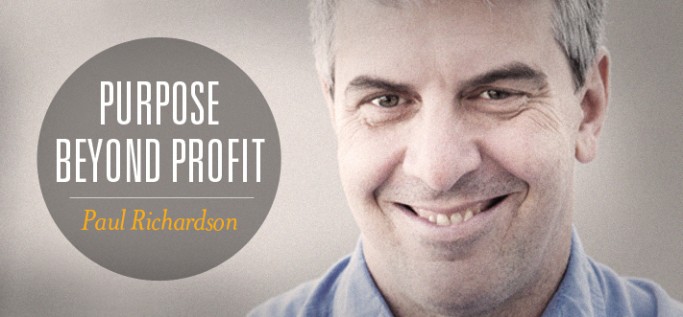
Paul Richardson: Why I Invest in Change Agents
Renewal Funds is a social venture capital firm that supports passionate, experienced change-agent entrepreneurs. institute B caught up with their CEO Paul Richardson and discovered why he believes investing in entrepreneurs who are motivated by a broader set of priorities, leads to better outcomes for all stakeholders.
institute B: Why have you chosen to address social and environmental challenges through venture capital, rather than through charity and philanthropy?
Paul Richardson: Our fund is not designed to replace charity and philanthropy which are incredibly important for all of us to continue to support. However, the for-profit world is much larger and the impact we have with our investment dollars is immense. We also wanted to help show that businesses can care about people and the planet and be very successful; they are not mutually exclusive.
How do you decide what businesses to invest in, and which to take a pass on?
The key questions for us are:
1. Mission fit;
2. Sector fit (organic food, green products, and environmental innovation;
3. Management (competency and values fit);
4. Stage fit (early stage – between $1m and $20m in revenues)
5. Financial fit with goals of the funds.
What are some challenges that come with investing in social enterprises?
I think that any factors that we would define as “social” generally make it easier to invest in things rather than more difficult. You are generally dealing with entrepreneurs who are motivated by a broader set of priorities which leads to better outcomes for all stakeholders.
How would you characterize your company’s culture?
We try to foster a “we” culture where it is recognized that each of us contributes in our own ways and that we are dependent on our investors and the great people running the portfolio companies. It is critical to us that individually and collectively as management we are careful not to overestimate our abilities and not to underestimate the contributions of others.
How does the financial success of social enterprises compare with more profit-driven businesses?
In the Renewal2 portfolio I would say that it has helped more than hurt. Last year the companies in the portfolio grew at a very healthy rate and there were many instances of our companies benefiting from their mission in practical ways: there were national launches with key retailers because of a commitment to organics, there were key store placements because of support for coops and there was an example of low cost inventory financing because of a company’s mission based sourcing.
What sectors have you seen making the greatest strides towards becoming more environmentally sustainable?
The exciting thing is that we are seeing great strides across all our sectors. For example, organic food companies are now starting to focus on their packaging. One of our companies just introduced a backyard compostable foil chocolate wrapper. All products and services can be more sustainable and motivated entrepreneurs are tackling these challenges.
Why do you think social and environmentally conscious firms have been underserved by investors for so long?
It depends on the sector, but many of them have been underserved because they require more patience than is practiced by many venture and private equity funds. There are not many investments in the environmental space that promise Twitter like returns, however I would argue that there may be less risk
Have other investment funds started noticing the success that Renewal Funds are having investing in social enterprises?
It is certainly our goal that our model and success can be used by other funds to raise capital for the space as ultimately our objective is to catalyze others and to change capital flows to models that incorporate externalities and that recognize that we all live on a resilient but constrained planet.
Is there growing interest from investors for investment funds that reflect their social values?
Thankfully there is. We have seen it both in respect of our funds, but also in terms of what is happening and being announced elsewhere. An example is the announcement by Morgan Stanley that they hope to have $10 billion in client capital in the impact space in 5 years. While we may not know fully what that announcement means as definitions of “impact” and “social finance” are still evolving it is still very exciting to see big goalposts being set for the future.
How do you market your company to investors who otherwise might be skeptical about investing in social and environmentally conscious businesses?
We let our companies speak for themselves. Once the investor digs into the work being done by some of the entrepreneurs that we are supporting even the most hard-nosed investor understands that these are real businesses being built by impassioned entrepreneurs creating exciting products or services that have the added benefit of creating positive rather than negative impacts on people and the planet. What’s not to like?

Good job Paul and Institute B, in putting forth another strong case for the wisdom of aligning values and money.